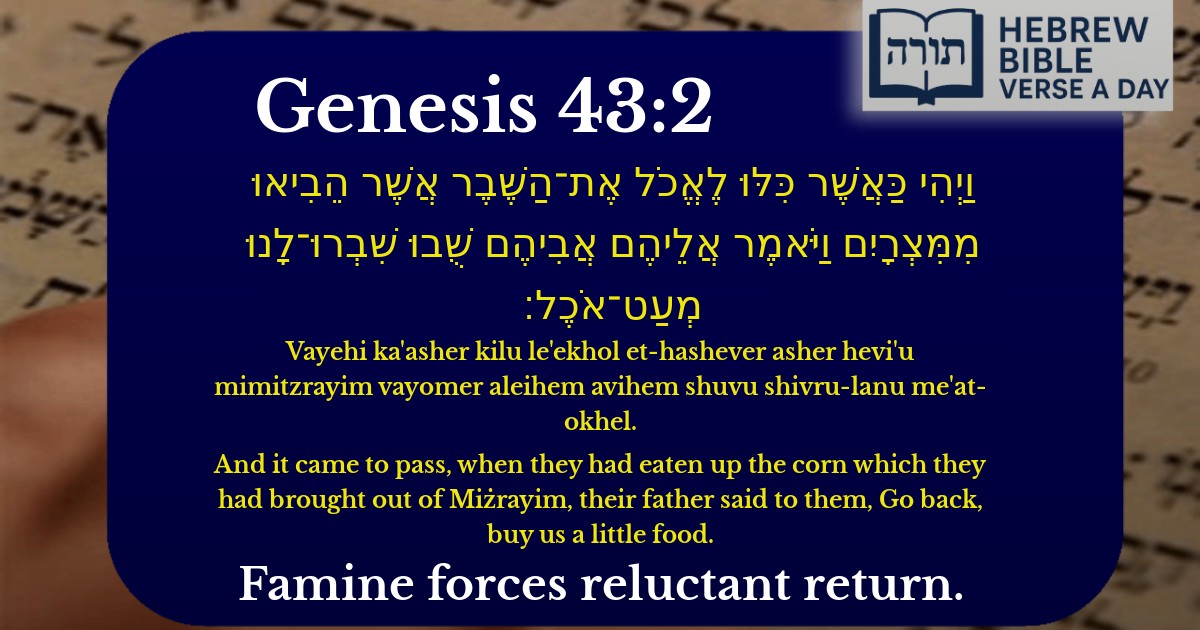Join Our Newsletter To Be Informed When New Videos Are Posted
Join the thousands of fellow Studends who rely on our videos to learn how to read the bible in Hebrew for free!
Hebrew Text
וַיְהִי כַּאֲשֶׁר כִּלּוּ לֶאֱכֹל אֶת־הַשֶּׁבֶר אֲשֶׁר הֵבִיאוּ מִמִּצְרָיִם וַיֹּאמֶר אֲלֵיהֶם אֲבִיהֶם שֻׁבוּ שִׁבְרוּ־לָנוּ מְעַט־אֹכֶל׃
English Translation
And it came to pass, when they had eaten up the corn which they had brought out of Miżrayim, their father said to them, Go back, buy us a little food.
Transliteration
Vayehi ka'asher kilu le'ekhol et-hashever asher hevi'u mimitzrayim vayomer aleihem avihem shuvu shivru-lanu me'at-okhel.
Hebrew Leining Text
וַיְהִ֗י כַּאֲשֶׁ֤ר כִּלּוּ֙ לֶאֱכֹ֣ל אֶת־הַשֶּׁ֔בֶר אֲשֶׁ֥ר הֵבִ֖יאוּ מִמִּצְרָ֑יִם וַיֹּ֤אמֶר אֲלֵיהֶם֙ אֲבִיהֶ֔ם שֻׁ֖בוּ שִׁבְרוּ־לָ֥נוּ מְעַט־אֹֽכֶל׃
וַיְהִ֗י כַּאֲשֶׁ֤ר כִּלּוּ֙ לֶאֱכֹ֣ל אֶת־הַשֶּׁ֔בֶר אֲשֶׁ֥ר הֵבִ֖יאוּ מִמִּצְרָ֑יִם וַיֹּ֤אמֶר אֲלֵיהֶם֙ אֲבִיהֶ֔ם שֻׁ֖בוּ שִׁבְרוּ־לָ֥נוּ מְעַט־אֹֽכֶל׃
🎵 Listen to leining
Parasha Commentary
📚 Talmud Citations
This verse is not quoted in the Talmud.


Context in the Narrative
The verse (Bereshit 43:2) occurs during the unfolding story of Yosef and his brothers, as Yaakov's family faces famine in Canaan. The brothers had previously traveled to Mitzrayim (Egypt) to purchase grain, where they unknowingly encountered Yosef, who had risen to power. Now, their provisions have run out, and Yaakov instructs them to return for more food.
Rashi's Commentary
Rashi notes that the phrase "when they had eaten up the corn" implies that the famine was still ongoing, as they had not yet received relief. He explains that Yaakov hesitated to send Binyamin with them (as Yosef had demanded) until the food was entirely depleted, showing Yaakov's reluctance to risk his youngest son.
Ramban's Insight
Ramban (Nachmanides) observes that Yaakov's instruction "buy us a little food" reflects both his caution and his hope that the famine might soon end. He suggests that Yaakov did not want to stockpile grain, trusting that Hashem would provide sustenance in due time.
Midrashic Interpretation
The Midrash (Bereshit Rabbah 91:5) highlights the word "שֻׁבוּ" (return), noting that Yaakov's command carries a deeper spiritual message. The brothers were being called not only to return to Egypt but also to introspection—to rectify the sin of selling Yosef, which had brought hardship upon the family.
Lessons from the Verse